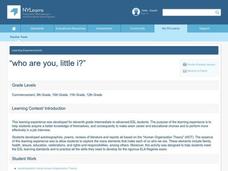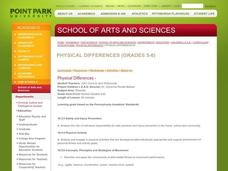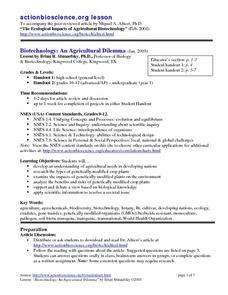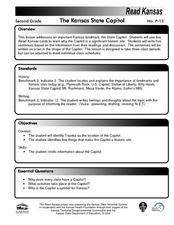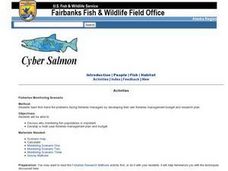Curated OER
World History Fair and Exposition
Students role-play as invitees to the World's Fair to develop a virtual electronic pavilion or poster presentation about the United States, its history and challenges. They act as tour guides giving their presentations and answering...
Curated OER
Who Are You?
Students explore the concept of self and analyze the Human Organization Theory. Individually, students write poems about themselves. In small groups, they create a poster related to the 14 categories of the Human Organization Theory....
Curated OER
Diversity
Students access prior knowledge of the five senses and relate to students with disabilities. In this people with disabilities lesson, students research and use a Venn diagram to compare and contrast famous people and their...
Curated OER
Exercise and Water
Second graders discover the needs of their body by trying different types of aerobic exercise. In this physical education lesson, 2nd graders analyze The Busy Body Book by glancing at the pictures inside and predicting what the content...
Curated OER
Using Words to Work Things Out
Students recognize a problem and how to resolve it. In this lesson, students listen to The Hating Book and discuss the events of the story. Students answer comprehension questions and relate to their own experiences. Students role play...
Curated OER
Rites of Passage
High schoolers explore coming of age ceremonies. In this rites of passage lesson, students research spiritual, religious, and secular child and adolescent rites of passage rituals. High schoolers design personal rites of passage.
Curated OER
The Mysterious Tragedy at Lake Nyos
Students present a convincing explanation of the Lake Nyos event and propose a solution to prevent future tragedies at central and western African lakes.
Curated OER
Human Sexuality Unit
Eighth graders determine how mass media influences human sexuality by looking at advertisements for their sexual content and how the ads affect their decision making. After evaluating the advertisements in a PowerPoint presentation they...
Curated OER
Creek Teach
Pupils develop lessons which they teach to younger students in a type of outdoor education camp.
Curated OER
Cats
Students participate in an after school program that promotes communication with others, solving problems, and making decisions. They experience getting in touch with themselves, about cats, training cats, showing cats and explore...
Curated OER
Word Picture - Communicating Visually
Students examine how words and visual images are used to influence people. They choose a word to illustrate using both lettering and visual images. They present their work and it is critiqued by a peer review.
Curated OER
Acid Attack
Pupils explore the effect of chemical erosion on statues and monuments. They use chalk to see what happens when limestone is placed in liquids with different pH values. They also discover several things that engineers are doing to reduce...
Curated OER
Physical Differences
Students role play what it would be like to have a physical disability. In this lesson on acceptance, students listen to the book A Rainbow of Friends by P.K. Hallinan. As a class, the students discuss similarities and differences in...
Curated OER
Biotechnology: An Agricultural Dilemma
Learners investigate the types of genetically modified crop plants there are and the benefits and risks of such plants. The agricultural needs in developing nations for this biological knowledge to resolve societal issues is also...
Curated OER
The Kansas State Capitol
Second graders research the Kansas state capitol building. In this historical landmark instructional activity, 2nd graders explore the Kansas state capitol. Over three days students explore the Governor's office, Senate and House of...
Curated OER
Ethics In The Science Classroom - Fraud In Science
Students are given a fictitious case study to read in preparation for the class. This instructional activity can also be readily adapted for a role-playing classroom exercise. They discuss the ethical issues of the case.
Curated OER
Movement, it's FUN-damental!
Students discover how muscles work. In this biology lesson, students explain the causes of fatigue and muscle soreness. They create graphs and compare results with their classmate.
Curated OER
Graph Around the Room
Students discuss the importance of taking care of their bodies. They brainstorm ways to take care of their bodies. They create a graph.
Curated OER
Anne Frank: Propaganda
Students discover techniques that are used to spread propaganda. They define what propaganda is and how it can be used in both a positive and negative manner. They produce an ad campaign for product.
Curated OER
Fisheries Monitoring
Pupils discuss why monitoring fish populations is important. They develop a multi-year fisheries management plan and budget.
Curated OER
Demography and Services of Fairfax County, Virginia
Twelfth graders are introduced to the demographics and services of Fairfax County, Virginia. In groups, they identify programs and services that should be supported by tax dollars and presnt them to the class in a PowerPoint presentation.
Curated OER
The Reality of War
Students use research materials developed earlier. They synthesize data to formulate an argument for or against war. Students use their notes to address what the possible answers could be.



